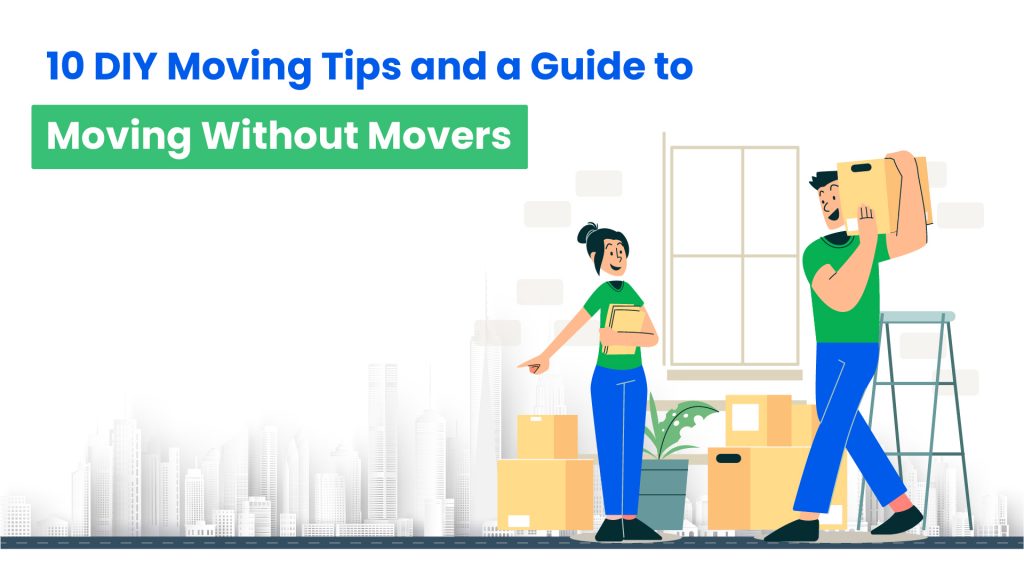You have decided to relocate without movers. The reasons may be many. You might have a smaller shift load that doesn’t require movers, any date changes in the relocation might not be accepted by movers, or you may have simply decided to shift your home yourself. But moving by yourself is a challenging task. You must be aware of these challenges and outset them to achieve a fail-proof relocation. You have to create a careful relocation plan and execute it properly.

Pros of Not Hiring Movers
1. No moving charges
The most beneficial thing about not hiring professing movers is that you save the expenses of hiring them. Moving by yourself is a sound option when you have a low budget to finance the move.
2. Relocate on your terms
You can decide, postpone, or make any changes to the relocation. You may decide to take it slow or rush it steadily. It’s your call.
Cons of Not Hiring Movers
1. You need to hire a truck or moving vehicle by yourself
It will be your task to find the right truck for your load and strike a deal with the truck owner. Sometimes, you may need help finding the right truck, or the owner may quote an over-priced truck.
2. You must load and unload the belongings to and from the truck
The main task of a moving company is to load, carry and unload your belongings from point A to B. When you decide to move by yourself, this workload falls on you.
3. All this must be done fail-proof, as you are liable for any damages
Moving is risky when you have a heavy and expensive load to transfer. You become liable to pay for any damages that occurred during the process.
4. It will require considerable time, energy and effort
Moving alone is a good idea only when you can spend the required time, energy and effort. If you rich things and hamper the process, you may have to end up making damage control.
5. Lack of Expertise
Hiring movers is to use their professional experience and expertise in relocation. When you move by yourself, you must fill in the necessary expertise to complete the job smoothly.
How to move by yourself?- DIY moving tips
You should pack kitchen items at last. While you should start packing home appliances, dinnerware, and utensils you won’t need before the move. You should typically preserve a few plates and necessary items. So you don’t have to eat every meal out before your relocation.
1. Plan the shift on a weekend
Plan your relocation on a weekend or continuous holiday slot. It would give you the time to pack, unpack and settle down.
2. Create a moving checklist
Create a checklist of the things you need to buy and the steps you need to follow. A checklist will help you track your progress while remembering everything.
3. Add an extra layer of packing
Add an extra layer of safety or packing to all your belongings.
4. Disassemble furniture, give insulated packing for electric appliances
Disassemble large furniture to pack it. Give insulated packing for kitchen and electric appliances.
5. Get rid of unwanted items and pack only wanted items
Get rid of junk and unwanted items. It will reduce your shift load and help you shift lightly, shift quickly. Pack all the required items-
- Label the carton boxes to avoid confusion.
- Convey instructions(if any ) to the truck driver before its departure.
- Finish any repairs pending in your new home.
- Get all the paperwork done before moving.
- Keep a track of your belongings during the transit.
Guide to moving without movers
House hunting
Finding a house is the first step of relocation. Choose an optimal property that goes well with your income and preferences. Survey the neighborhood and the property to know its prospects and perils. Once you decide on the home, you can decide upon other things easily including how to move by yourself.
Plan every step
Before you jump to relocation, plan every aspect. From packing supplies to truck assignment to unloading and payments, plan it out before. It will provide you with a framework to execute your move. Go for a step-by-step plan with defined timelines.
Shop packing supplies
An essential step before packing is shopping for all the necessary supplies. Inspect the items and furniture in your home, list packing supplies needed and keep them ready.
Here are some packing supplies featured in every wishlist-
- Furniture covers and blankets for wooden and non-wooden furniture
- Carton boxes for small articles
- Mattress covers for beds
- Heavy duty tapes, tool kit, scissors, bubble wrap, packing peanuts etc.
- Pack with care
It is a reminder you need to keep in mind while packing.
- Disassemble large items and pack them separately.
- Cushion mirrors and delicate articles with bubble wrap or plastic wrap
- Fill the empty spaces in carton boxes with packing peanuts or paper to avoid friction.
Pack in advance
Remember to pack your stuff in advance. You will be responsible for loading, transporting and unloading the luggage. If you postpone packing to the moving day, you will have to rush it, steering your belongings towards potential damage.
Contact truck services
Contact a truck driver or service depending on the volume of your luggage. Get a price estimate, inspect the truck (to see if your belongings will fit in the space), decide on the time and date and strike a deal.
Mandatory kit of essentials
Supervising relocation can be a difficult task. The consignment may reach you early or late. Nevertheless, you should be prepared with a survival kit to face any delays or changes.
What to pack in your essentials kit?
- Two sets of clothes
- Toothbrush and mouth freshness
- Bathing kit
- Official documents
- Cash
- Medicines you take daily
- Instant food items
- Drinking water
- Torch
- Power bank or charger
Why do you need to pack an essential kit?
There might be delays in package delivery or any emergencies. Even if your package is delivered, you will need time to unpack them. You can rely on the essentials kit until you unpack and settle down in your new house.
Sign up for services
Sign up for water, gas, electricity, broadband, groceries, newspapers and other necessary services by the time you move into your new home. Moving is stressful, and prioritizing the above services can save you money.
Take up insurance
Take up insurance for expensive and delicate articles. If any articles get damaged while moving by yourself, you have none to blame but yourself. Insuring items can compensate you in case of any damages.
Contact helpers
If you are shifting a heavy load, you can ask friends or family members who can help with the task. Running a one-person show with large tasks at hand may overburden you. So assess the shift load and contact any volunteers who can help you with relocation.
Loading and unloading
Since you have opted for a Do-It-Yourself move, extra care needs to be taken while loading and unloading your belongings. While loading your items to the truck, roll a carpet or blanket on the floor while dragging heavy items. It will avoid friction. Seal the edges of heavy appliances, refrigerators, and mirrors with cardboard to avoid damage.
Wrap plastic around carton boxes to give them waterproof packing. Fill the empty spaces inside the truck with corrugated sheets to avoid a collision.
And your relocation is done!!
Moving by yourself is not an easy task. But with careful planning and execution you now know how to move by yourself. Have a happy relocation.


